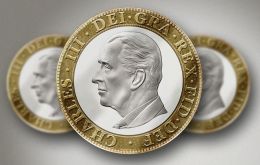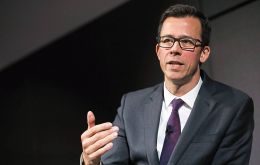MercoPress. South Atlantic News Agency
Tag: Bank of England
-
Friday, October 14th 2022 - 10:20 UTC
Bank of England to the rescue, “to restore orderly market conditions”

The Bank of England unveiled further measures to calm market turmoil triggered by the UK mini budget announcement. The bank said it would spend up to 5 billion pounds (€5.7 billion, US$5.5 billion) per day on inflation-linked government debt bonds, or gilts, to further prop up Britain's £2.1-trillion bond market.
-
Thursday, September 29th 2022 - 09:20 UTC
Bank of England to the rescue of first stumble of PM Truss economic program

Britain's central bank on Wednesday warned that dwindling confidence in the economy poses a significant risk as it took the unusual step of intervening directly in financial markets. The move was aimed at restoring financial stability in markets shaken by the Liz Truss government fiscal policies.
-
Wednesday, September 21st 2022 - 09:46 UTC
A portrait of King Charles III must be chosen before replacing bills and coins in circulation

British banknotes and coins in circulation with the Queen's portrait will slowly be replaced by new printed and minted banknotes and coins bearing King Charles III portrait. The Bank of England has not yet given any details, saying that more will be known once the period of mourning has passed.
-
Saturday, July 30th 2022 - 08:01 UTC
London court rules against Maduro-appointed BCV board to handle gold

London High Court Judge Sara Cockerill Friday ruled against that President Nicolás Maduro's stance in the case involving Venezuela's gold reserves deposited in the Bank of England.
-
Friday, May 6th 2022 - 09:09 UTC
Bank of England combats inflation by increasing base rate interest to 1%

The Bank of England on Thursday increased for the fourth consecutive time the base rate interest to 1% in an attempt to contain inflation and despite admitting the prospect of recession. The energy crunch, the Russian war in Ukraine, and lesser household incomes are expected to contribute to weaker growth.
-
Friday, February 4th 2022 - 09:37 UTC
Bank of England increases rate to 0,5% and begins reduction of bond purchases

The Bank of England’s Monetary Policy Committee (MPC) this week voted by a majority of 5-4 to increase Bank Rate by 0.25 percentage points, to 0.5%. Those members in the minority preferred to increase Bank Rate by 0.5 percentage points, to 0.75%.
-
Thursday, January 6th 2022 - 07:55 UTC
Bank of England answers, “Why can't we just print more money?”

“Can’t we just print more money?” is a new pop-economics book, written by the Bank of England, which will be published this May in partnership with Cornerstone Press (Penguin Random House).
-
Monday, February 22nd 2021 - 07:03 UTC
Bank of England divided over the use of negative interest rates

A member of Bank of England's Monetary Policy Committee, Gertjan Vlieghe, openly supported the use of negative interest rates if the U.K. needs more stimulus, while Deputy Governor Dave Ramsden said the bank still had scope for more quantitative easing. which has been a tried and tested policy.
-
Friday, February 5th 2021 - 08:21 UTC
Bank of England tells banks to prepare for negative interest rates

The Bank of England (BOE) told banks to start getting ready for negative interest rates but added that the message shouldn’t be taken as a signal that the policy is imminent. The BOE made the announcement as it held its key rate at a record low of 0.1%.
-
Friday, November 27th 2020 - 08:05 UTC
Maradona's contribution to monetary policy, according to Lord Mervyn King

Even the Financial Times referred to the death of Diego Armando Maradona, one of the most gifted footballers to ever play the game. In effect, the FT recalls that while his dribbling prowess was world-renowned, fewer people know that his skills were used to construct one of the most memorable monetary policy analogies of all time.
